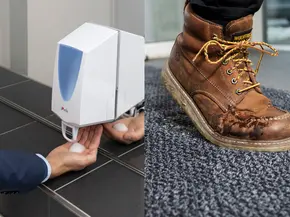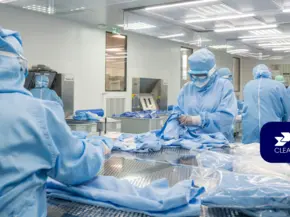Modern Slavery Statement
Elis UK Limited Modern Slavery Act Slavery and Human Trafficking Statement for financial year ending 31 December 2024
INTRODUCTION
This statement is made pursuant to section 54(1) of the Modern Slavery Act 2015 and is the statement of Elis UK Limited (the “Company”) for the financial year ending 31 December 2024. This statement details the steps taken by the Company to prevent slavery, servitude and forced or compulsory labour, and human trafficking taking place in any part of its business or supply chain.
The Company is part of the Elis group (the “Group”) owned by Elis S.A., a company listed on the Paris stock exchange. It operates with full consideration of the need for ethical business practices, including in respect of human rights and decent working conditions.
The Group’s commitment to ethical business practices is documented in the Group’s Code of Ethics. Its principles apply to the Group as a whole, its employees and the way it does business with its suppliers. The Group’s values are consistent with the fundamental principles laid down by the United Nations (UN) Universal Declaration of Human Rights and the European Convention on Human Rights, the UN Convention on the Rights of the Child and the UN Global Compact.
The Group’s “Vigilance Plan” includes measures to identity risks and prevent serious violations of human rights, health and safety and the environment, including the Sustainable and Ethical Purchasing Charter (also known as the “Supplier Code of Conduct”), which has been in place since 2006.
The Supplier Code of Conduct confirms the Group’s commitment to promoting and adhering to international human rights principles and it sets out the standards imposed on the Group’s suppliers and subcontractors regarding fair practices, human rights (in particular, forced labour, child labour, working time, compensation and discrimination) working conditions, freedom of association and collective bargaining, and environmental protection. The entire Group is fully aware of, and committed to, its legal and moral obligations to prevent forced, bonded or compulsory labour and human trafficking. The Company (together with the Group) is committed to improving its practices wherever possible in the fight against modern slavery and human trafficking.
ELIS UK BUSINESS
The Company provides a complete textile rental and laundry service to customers across a variety of industries. It supports customers by renting and servicing linen, workwear, and mats, and providing washroom and hygiene services as well as surgical and cleanroom solutions. The customers served by the Company through its network of laundries and production facilities, are varied and broadly carry out their activities in restaurant & catering, hospitality, health & social care, industry, commerce and services.
The Company currently has approximately 5500 employees within the UK, operating 33 facilities across England, Wales and Scotland.
The Group employs approximately 57,500 employees in 30 countries and in 2024 posted consolidated revenues of 4,573.7 million euros.
SUPPLY CHAIN
The supply of goods, services and products is managed by the UK procurement and supply chain teams, with support and assistance from the Group’s procurement function. The Group’s procurement function leads on corporate social responsibility (“CSR”) to assist national subsidiaries with selecting business partners. In 2024 the Group’s purchasing team was strengthened by the arrival of a supplier CSR coordinator whose role is in part to assist with the Group’s supplier assessment policy.
Although the Company’s main business partners are located in Europe, it sources a majority of goods, services and/or product such as textiles from the Indian subcontinent and Asia, including Pakistan, Cambodia, Laos, Vietnam and Bangladesh.
The Group continues to work to rationalise its panel of business partners. This rationalisation should facilitate the implementation of the Group’s ethics values, including the fight against modern slavery and human trafficking.
ASSESSMENT OF MODERN SLAVERY RISK WITHIN OUR BUSINESS
The Company believes the main risks regarding modern slavery relate to its suppliers in higher risk jurisdictions.
A significant part of the Company’s supply requirement is procured through the UK supply chain department. Not only does concentrating the procurement of goods and services within a centralised team result in better oversight of the Company’s supply chain, it also ensures procurement activities are carried out by a team trained and experienced in ethical and responsible purchasing.
The Company, with the help of the Group’s procurement function, ranks, assesses and manages its risks in relation to ethics by focusing on the higher risk countries from which it sources products and textiles. On that basis efforts continue to be concentrated on supply from the Indian subcontinent and Asia.
Mindful of its responsibilities as an employer, the Company enforces strict right to work and compensation checks to mitigate modern slavery risks within its workforce in the UK.
Right to work checks must be satisfied before an individual commences any type of work, whether it is paid or unpaid, or if it constitutes training or induction activities to ensure that they are legally allowed to work in the UK. All right to work documentation must be examined in the presence of the relevant individual to ensure the documents are genuine, that the person presenting them is the prospective employee and the photograph and dates of birth are consistent across documents and with the person’s appearance.
All employee compensation must be paid to bank accounts which have an account name matching the individual’s name prior to employment commencement. Payments are only made into the individual’s own account or joint account. Bank account verification is required for each new employee with individuals required to provide signed confirmation of the relevant account details.
POLICIES IN RELATION TO SLAVERY AND HUMAN TRAFFICKING
The Company has a zero-tolerance policy towards any breach of human rights, including modern slavery and human trafficking.
It is committed to operate in accordance with the law and to promote the highest standards of integrity and share their values with employees and business partners.
The Group’s Supplier Code of Conduct, which is available on the Company’s website (https://uk.elis.com/en/group/about-us/our-csr-policy), sets out expectations for responsible and ethical purchasing, including in respect of human rights. It was adopted by the Company in October 2019, after it became part of the Group.
Business partners are required to commit to the Code of Conduct and, therefore, limit their environmental impact, work towards sustainable development and act ethically.
Specifically, the Code of Conduct requires business partners to:
- recognise and respect the protection of internationally proclaimed human rights;
- comply with the UN Global Compact principles on human rights and labour;
- take part in the fight against any kind of corruption including extortion, bribery, influence peddling and facilitation payments;
- ensure the provision of a safe working environment for employees;
- strictly prohibit the use of child labour or any form of slavery, forced labour and human trafficking;
- ensure labour conditions are fair, employees are paid a regular salary in accordance with their employment contracts and the law, and all legal requirements are complied with; and,
- prevent any form of discrimination based upon any distinction such as race, gender, age, ethnicity, political opinion and origin.
In addition, the Company encourages employees to report and/or raise concerns internally to the compliance team and to disclose information which the individuals believe highlights or could indicate illegality, unethical behaviour or other serious wrongdoing, including any instances or suspicions of modern slavery. This is reinforced by the availability of an independent whistleblowing tool for employees and suppliers to use if they are not comfortable raising concerns internally.
DUE DILIGENCE AND MANAGEMENT OF MODERN SLAVERY RISK
Elis UK Limited supports the implementation of the Group policy with its suppliers by carrying out audits, either through the Group or with the help of an independent audit company. These audits are intended to check that business partners are properly applying the Group’s ethics principles.
Internal processes are complemented by QIMA, an external expert assurance provider, which provides screening and ongoing audit of compliance. It reports compliance levels and alerts the Company to any areas requiring improvement.
In order to improve audit efficiency, the Company has been implementing an audit methodology consistent with that used by the Group. The main elements of the methodology are:
- objective and explicit criteria to assess how strategic a business partner is to the Company;
- an evaluation of the business partners with respect to CSR (through reference to international norms such as ISO26000 or SA8000+ISO14001 or through compliance with international auditing standards such as SEDEX/SMETA, BSCI).
The methodology facilitates optimisation of the partner audit process by defining and prioritising the audit operations.
If, on completion of an audit, a business partner is found to be non-compliant with the Group's ethical principles, it may be given the opportunity to define and implement necessary corrective actions. Alternatively, depending on the severity, the relevant business relationship may be terminated, and/or the relevant partner may be excluded from invitations to tender.
MONITORING EFFECTIVENESS
In 2024, 39 on-site CSR audits were conducted in relation to the Group’s direct suppliers. While more than 50% were commissioned by the Group itself, the total number includes external certifications and audit reports that meet the Group’s assessment criteria. Those audits did not reveal any serious compliance breach.
In terms of KPIs, the Group monitors the percentage of direct spend which has undergone a supplier audit. The Group’s aim is to achieve 95% of procurement spend with direct suppliers that have undergone a CSR assessment in the previous three years.
The Group provides a whistleblowing tool, accessible worldwide to report any situation contrary to the Group’s Code of Ethics, including any situation that violates applicable laws and regulations, as well as any risk of serious harm to human rights and fundamental freedoms, human health and safety, and the environment. The system is accessible 24 hours a day, 7 days a week, to address a written or voice message in one of the Group’s 18 local languages.
No concerns relating to modern slavery were reported through the whistleblowing line or raised through audits in 2024.
TRAINING
It is important that the Company’s staff are aware of and understand the risks of slavery and human trafficking. Staff must be able to identify signs of slavery and human trafficking and be aware of what action to take if such activities are suspected.
The Company provides online training modules designed to support ethical compliance across the business. All employees involved in management, purchasing or customer service are required to undertake the training. This is also an established, and mandatory, part of the training and induction programme for new joiners.
FURTHER STEPS
The Company is aware of the destructive nature of modern slavery and therefore understands the risk associated with modern slavery must be monitored and managed on a continual basis. The Company, together with the Group, will continue to monitor operational practices, review its approach and consider what steps it might reasonably take in the year ahead.
This statement was approved by the Company’s Board.
Signed
Mark Franklin
Chief Executive Officer, UK
Want to know more? Contact us.
*Required fields
Contact details
Your legal name is the name that appears on your official documents.






